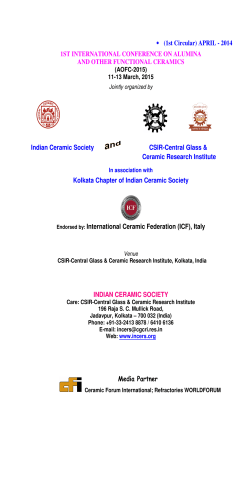
REPORT “International trade principles: how to ensure better enforcement?
REPORT Ceramic Days Trade Conference: “International trade principles: how to ensure better enforcement? 26 November 2013 Hotel Sofitel Europe - Place Jourdan 1, Brussels From left to right: Kevin Oakes, CEO Steelite International and European Federation of Ceramic Table- and Ornamentalware (FEPF) President; Jacques Bourgeois, Lawyer, WilmerHale and Professor, College of Europe; Signe Ratso, Director, European Commission; Carlo Pirrone, Confindustria The conference on trade – International trade principles: how to ensure better enforcement? – dealt with vital concerns regarding the European Union’s enforcement of international trade rules to tackle unfair trade practices affecting market access for EU businesses. The event was moderated by Carlo Pirrone from Confindustria, who pointed out the paradox of the increasing number of trade barriers despite the growing Eight European ceramic industry amount of free trade agreements and legislation. By way of example, Mr Pirrone signalled that the eight European sectors […] face around 100 tariff ceramic industry sectors – 80% of which are composed of and non-tariff barriers. small and medium-sized enterprises (SMEs) – face around – Mr Pirrone 100 tariff and non-tariff barriers. 1 DG Trade Director Signe Ratso affirmed that the European ceramics industry, with its positive trade balance, is a “global player” and an “export champion”. Ms Ratso presented the toolbox available to the European Commission to fight unfair trade practices and indicated that between 2008 and 2012 one third of the 220 most harmful business obstacles identified in 32 main export markets across various industry sectors The European ceramics industry, were either solved or progress was made. She highlighted with its positive trade balance, is that in December 2012 the Commission proposed a a “global player” and an “export regulation for applying and enforcing international trade champion”. rules to safeguard the EU’s interests. When unfair trade – Ms Ratso practices occur, the Commission uses the most appropriate tools from a wide range of actions to enforce trade rules, which include direct contacts, dialogues, bilateral meetings, summits, negotiations of FTAs or WTO accessions, and as last resort, dispute settlement. To fight barriers to trade more effectively, Ms Ratso specified that companies or their associations should clearly indicate the CN codes for concerned products and outline the financial impact of a trade barrier. Lawyer and Professor Jacques Bourgeois took a more critical approach and underlined that although Europe has resolved tariff barrier issues with its economic partners, it is currently impacted by ‘behind the border measures’. These measures might appear to have increased in recent years but in reality have always existed in the shade of tariff barriers. Now that tariffs have been significantly reduced, technical barriers to trade are increasingly perceived as obstacles to free trade. Mr Bourgeois presented the tools The Commission could be “a little available to EU industry stakeholders and the European bit more daring and a little less Commission to address these existing barriers to trade. cautious in handling the TBR.” However, according to Mr Bourgeois, companies often – Mr Bourgeois refrain from using the so-called Trade Barriers Regulation (TBR) – a tool for industries affected by discriminatory treatment in foreign markets – after having tested the waters. If companies launch a complaint through the TBR, they must demonstrate that the evidence is well-founded. Lastly, he called for a more globalised approach within the Commission when dealing with trade barriers and urged the Commission to be “a little bit more daring and a little less cautious in handling the TBR.” Despite many existing tools, the ceramic industry faces an increasing trend in trade barriers including high tariffs, burdensome certification and counterfeiting, as evidenced by the testimony of Kevin Oakes, CEO Steelite International and new FEPF President, Once [obstacles have been] the European Federation of Ceramic Table- and Ornamentalware. Since 84% of Steelite’s turnover is overcome, the company very generated from exports, the company had to invest often faces additional challenges considerably in many legal reviews and IPR procedures to through counterfeited products register their products all around the world. Mr Oakes and stolen IPRs. underlined that it is essential to overcome obstacles such – Mr Oakes as increasing energy costs, taxes and bureaucracy and make huge investments in design, quality and employees 2 in order to stay competitive and successful on the market. However, once overcome, the company very often faces additional challenges through counterfeited products and stolen IPRs, posing a serious threat to the enterprise. During the discussion the audience brought up other issues such as reciprocity in relation to other trade issues, including origin marking and certification requirements. Furthermore, it was suggested that the differences in energy prices between the US and the EU, an issue affecting trade because of lower competitiveness, should ideally be addressed within the ongoing negotiations for the EU-US Transatlantic Trade and Investment Partnership. Participants offered that the existing tools for trade defence take too much time to fight unfair trade practices efficiently. Another point of debate was the possible actions of European companies against current Russian trade obstacles, considering the already turbulent EU-Russia relations. The conference was concluded with a question as to how better cooperation could be achieved by all the relevant services of the European Commission and national customs in order to ensure better enforcement of international trade rules at customs level and regarding IPR issues and technical barriers to trade. This conference was held as a part of Cerame-Unie’s Ceramic Days 2013. For further information and to view the speakers’ presentations please visit www.cerameunie.eu. The European Ceramic Industry covers a wide range of products including abrasives, brick & roof tiles, clay pipes, wall & floor tiles, refractory products, sanitaryware, table- & decorativeware, and technical ceramics. The industry generates more than 200,000 direct jobs and a production value of €25 billion within the EU. Cerame-Unie aisbl Rue de la Montagne 3 17 – 1000 Brussels Tel: +3228083880 – Fax: +3225115174 – E-Mail: [email protected] www.cerameunie.eu
© Copyright 2026





















